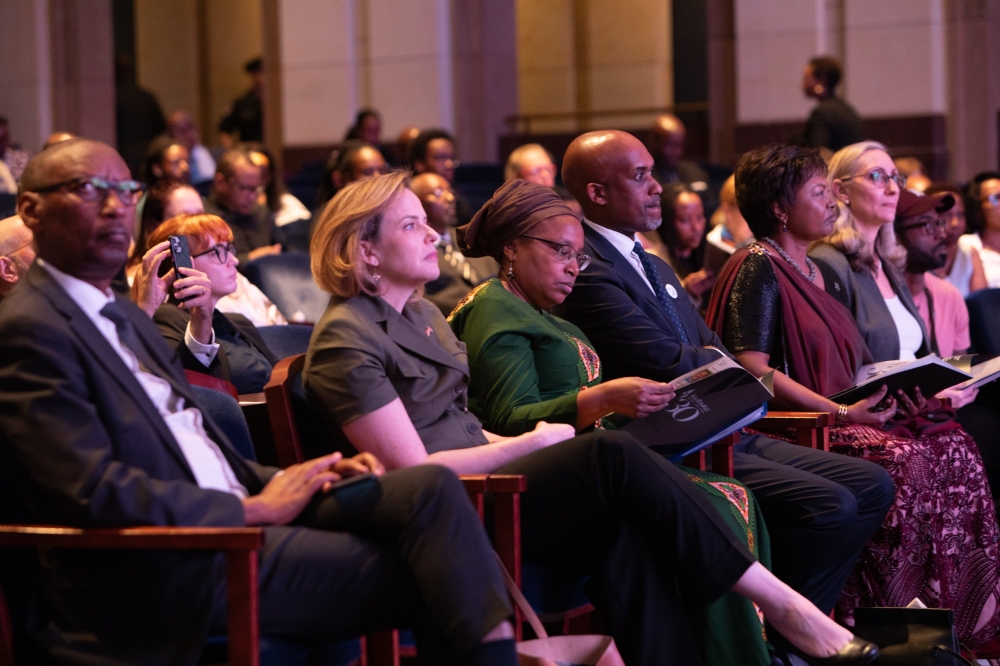

Trent Kelly, a member of the US. House of Representatives, on April 15 highlighted the need to refer to the 1994 genocide against the Tutsi in Rwanda by its proper name, noting that he has introduced a house resolution calling for the United States to adopt the official name of the Genocide that ravaged Rwanda.
"The facts are the facts, it’s not the Rwandan Genocide, it’s the 1994 Genocide against the Tutsi in Rwanda, I call on the State Department administration to call it exactly what it is,” the American lawmaker said.
ALSO READ: Kwibuka: Kagame speaks out on ambiguity over Genocide
The call was echoed as the Rwandan community and friends of Rwanda gathered at the Capitol Hill in Washington D.C to honor the over one million innocent civilians killed during the 1994 Genocide against the Tutsi. Also present at the commemoration event were members of the diplomatic corps, lawmakers, and academia, among other dignitaries. Trent Kelly’s call is the latest sign in a series of appeals made to the American government to adopt the official name of the Genocide against the Tutsi.
ALSO READ: UN official echoes warning over risk factors for genocide
"We have a moral obligation to ensure the lessons of history are not forgotten and the voices of the victims are heard,” Kelly added.
Congresswoman Sheila Cherfilus-McCormick emphasised that the 1994 Genocide against the Tutsi is a global wake-up call, further urging collective efforts to prevent its recurrence, "while also acknowledging Rwanda's remarkable transformation from nearly a failed state to a model nation.”
"I was impressed by your administration’s progress on the development front, combating corruption and improving governance. I commend President Paul Kagame and Rwandans for their leadership and commitment to building the Rwanda we see today that serves as a model to other countries.”
On April 7, as Rwandans and the whole world commemorated, for the 30th time, the 1994 genocide against the Tutsi, the government of Rwanda received many solidarity messages from around the world but one controversial message, a post on X (former Twitter) by US Secretary of State Antony Blinken, created a storm on social media. Like he has done before, Blinken did not call it the 1994 genocide against the Tutsi.
But at the Capitol Hill, Corina Sanders, the Deputy Assistant Secretary for African Affairs at the US Department of State, maintained that any attempt to misrepresent the historical record for "political purposes” should be opposed.
"As we join in remembering the victims and reaffirm our support for the people of Rwanda in the continued efforts for unity and renewal, we oppose any attempt to misrepresent the historical record for political purposes, in particular, we strongly oppose any denial or minimisation of the Genocide that targeted [the] Tutsi,” she said.
During the commemoration event at Capitol Hill in Washington D.C, testimonies, songs, and speeches reflected on Rwanda's transformational journey in the last 30 years. Other activities included panel discussions around the emergence of a new generation of Rwandans committed to a future free of hatred and division.
Congerssman Jonathan Jackson also commended President Kagame's leadership, particularly for transforming Rwanda into a model nation.
He said: "I commend President Paul Kagame for his leadership in guiding the country to heal, reconcile and unite. His courage, dedication, and ability to move the country to become one of the fastest-growing countries in the world must be commended. Rwanda continues to be a beacon for many African countries and across the world.”
The Minister of Justice, Emmanuel Ugirashebuja, shared insights into how remembering and honoring the victims of the 1994 Genocide against the Tutsi serves as a crucial step in preventing future genocides.
He said: "It’s our solid duty to remember the victims, to honor their resilience and to ensure that their stories are kept in our collective consciousness. By doing so we not only pay tribute to those who suffered but also lay the ground for preventing such atrocities from happening again.”
Mathilde Mukantabana, Rwanda’s envoy to the US, said: "We must increase cooperation and partnerships to confront this evil. We must remain alert and dare to speak out when people are attempting to rewrite and scramble our history.”
As earlier highlighted by Amb Olivier Nduhungirehe, Rwanda’s envoy to the Netherlands and a former Deputy Permanent Representative to the United Nations (2010-2015), according to the 1948 Genocide Convention, genocide is a crime committed "with intent to destroy, in whole or in part, a national, ethnical, racial or religious group, as such". This means that this crime, he noted, unlike crimes against humanity or war crimes, requires a special intent, as it must be committed against members of a specific group, targeted for who they are, with the intent to erase them from the face of the earth.
Therefore, Nduhungirehe explained, based on this definition, it is impossible that the genocide in Rwanda could have targeted "Tutsis, Hutus, Twas, and others” altogether, unless Secretary Blinken suggests that there were three separate genocides – one against each group, or a single genocide against the Rwandan national group, which would mean that the victims were targeted, not for their "ethnicity” but for their Rwandan nationality.
"And we know that both options are historically untrue.”
Second, Nduhungirehe noted, the crime of genocide in a specific place needs to be established by a court of law. For the case of Rwanda, he said, genocide was established by the Trial Chamber of the UN International Criminal Tribunal for Rwanda (ICTR) in its very first judgment "Akayesu” of September 2, 1998. In the latter judgement, Nduhungirehe recalled, the Tribunal concluded that "the crime of genocide was indeed committed in Rwanda in 1994 against the Tutsi as a group”.
Eight years later, in a judicial notice dated June 16, 2006, the ICTR Appeals Chamber confirmed all previous judgements by ruling that it was a "fact of common knowledge” that "there was a genocide in Rwanda against the Tutsi ethnic group”.
Third, he pointed out, the 1994 Genocide against the Tutsi in Rwanda was also recognized by the UN.
The crime was first recognized by the UN Security Council, through Resolution 2150 of April 16, 2014, and then recognized by the UN General Assembly in a Decision of January 26, 2018 and a Resolution of April 20, 2020, in which the General Assembly reaffirmed April 7, of every year, "as the International Day of Reflection on the 1994 Genocide against the Tutsi in Rwanda.”


